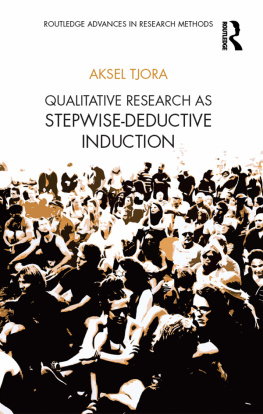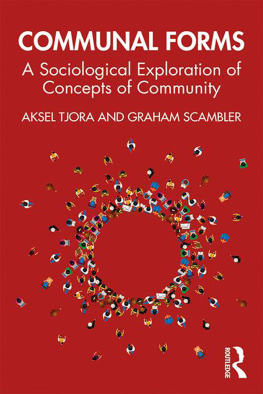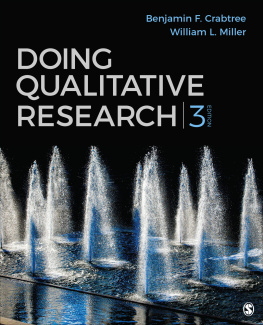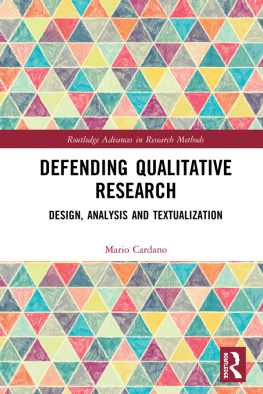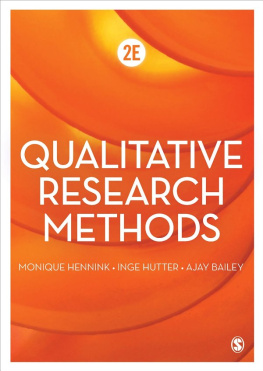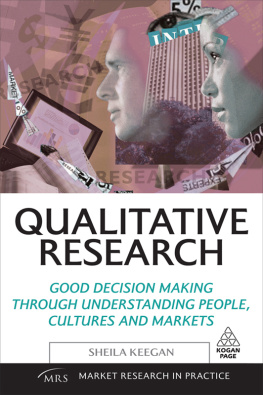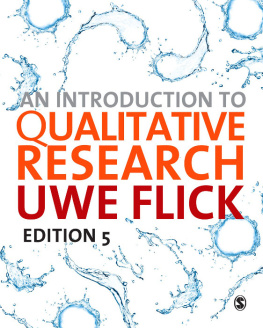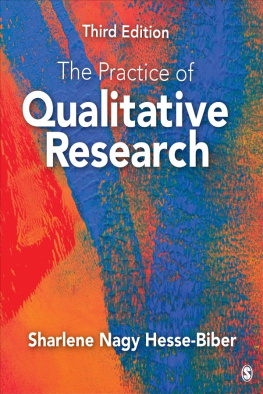This book offers a refreshing and reinvigorating take on qualitative research as a creative and adaptive exercise rather than a formulaic activity. Tjoras approach challenges many of the entrenched practices and assumptions of contemporary qualitative research practice, and in line with his previous work, his approach is to challenge the status quo as well as offer a realist, in-depth, and usable approach to qualitative practice. This book is insightful, nuanced but pragmatic and practical, and thus will resonate across academic levels (students to academics) and a wide range of academic disciplines interested in best practice in qualitative enquiry.
Alex Broom, University of New South Wales, Sydney, Australia
A highly insightful introduction to qualitative research that addresses the challenges of data generation and analysis and powerfully demonstrates the importance of curiosity, creativity, and methodological flexibility in undertaking interpretative research.
Christian Heath, Kings College London, UK
A corrective to the misunderstood nature of Grounded Theory, Tjora offers novel ideas on how to generate superior qualitative data. In addition, the book can be used as a primer for novice researchers to learn about observations, interviews, documents, and analysis/coding.
Peter Adler, University of Denver (Emeritus), USA
Qualitative Research as
Stepwise-Deductive Induction
This book provides thorough guidance on various forms of data generation and analysis, presenting a model for the research process in which detailed data analysis and generalization through the development of concepts are central. Based on an inductive principle, which begins with raw data and moves towards concepts or theories through incremental deductive feedback loops, the stepwise-deductive induction approach advanced by the author focuses on the analysis phase in research. Concentrating on creativity, structuring of analytical work, and collaborative development of generic knowledge, it seeks to enable researchers to extend their insight of a subject area without having personally to study all the data generated throughout a project. A constructive alternative to Grounded Theory, the approach advanced here is centred on qualitative research that aims at developing concepts, models, or theories on basis of a gradual paradigm to reduce complexity. As such, it will appeal to scholars and students across the social sciences with interests in methods and the analysis of qualitative data of various kinds.
Aksel Tjora is Professor in the Department of Sociology and Political Science at the Norwegian University of Science and Technology (NTNU). His current research is on social interaction and communal processes in relation to organizations, culture, public space, and communication technologies.
Routledge Advances in Research Methods
For more information about this series, please visit: www.routledge.com/Routledge-Advances-in-Research-Methods/book-series/RARM
Commons, Sustainability, Democratization
Action Research and the Basic Renewal of Society
Edited by Hans Peter Hansen, Birger Steen Nielsen, Nadarajah Sriskandarajah and Ewa Gunnarsson
Phenomenology as Qualitative Research
A Critical Analysis of Meaning Attribution
John Paley
Sharing Qualitative Research
Showing Lived Experience and Community Narratives
Edited by Susan Gair and Ariella Van Luyn
Walking Through Social Research
Charlotte Bates and Alex Rhys-Taylor
Social Research Methods in Dementia Studies
Inclusion and Innovation
Edited by John Keady, Lars-Christer Hydn, Ann Johnson, Caroline Swarbrick
Walking Methodologies in a More-than-human World
WalkingLab
Stephanie Springgay and Sarah E. Truman
Doing Research In and On the Digital
Research Methods across Fields of Enquiry
Edited by Cristina Costa and Jenna Condie
Qualitative Research as Stepwise-Deductive Induction
Aksel Tjora
First published 2019
by Routledge
2 Park Square, Milton Park, Abingdon, Oxon OX14 4RN, UK
and by Routledge
711 Third Avenue, New York, NY 10017
Routledge is an imprint of the Taylor & Francis Group, an informa business
2019 Aksel Tjora
The right of Aksel Tjora to be identified as author of this work has been asserted by him in accordance with sections 77 and 78 of the Copyright, Designs and Patents Act 1988.
All rights reserved. No part of this book may be reprinted or reproduced or utilised in any form or by any electronic, mechanical, or other means, now known or hereafter invented, including photocopying and recording, or in any information storage or retrieval system, without permission in writing from the publishers.
Trademark notice: Product or corporate names may be trademarks or registered trademarks, and are used only for identification and explanation without intent to infringe.
British Library Cataloguing-in-Publication Data
A catalogue record for this book is available from the British Library
Library of Congress Cataloging-in-Publication Data
Names: Tjora, Aksel, author.
Title: Qualitative research as stepwise-deductive induction / Aksel Tjora.
Description: Abingdon, Oxon; New York, NY : Routledge, 2018. | Series: Routledge advances in research methods ; 26 | Includes bibliographical references and index.
Identifiers: LCCN 2018003050| ISBN 9781138304475 (hbk) | ISBN 9781138304499 (pbk) | ISBN 9780203730072 (ebk)
Subjects: LCSH: Qualitative research. | Social sciencesMethodology.
Classification: LCC H62. T5496 2018 | DDC 001.4/2dc23 LC record available at https://lccn.loc.gov/2018003050
ISBN: 978-1-138-30447-5 (hbk)
ISBN: 978-1-138-30449-9 (pbk)
ISBN: 978-0-203-73007-2 (ebk)
Typeset in Times New Roman
by RefineCatch Limited, Bungay, Suffolk
Since I started teaching qualitative research methods in 1998 I have been constantly hunting for equilibrium between systematic stringency and interpretative creativity. With the refinement of the stepwise-deductive inductive (SDI) approach over the last ten years, and a growing number of studies successfully applying this research framework, the feeling of such a balance is within reach. While social science researchers and students in Scandinavia have been applying the SDI approach for about ten years, this book is the first complete international presentation of the model.
It would be impossible to continue refining and polishing the SDI approach if it was not for the enthusiast students and researchers that have been applying and testing the framework in a wide range of empirical studies. Especially, the members of the Sociology Clinic in the city of Trondheim (Norway) have established practices of collaborative qualitative analysis that have both provided important input to the approach and interesting research findings.
Hopefully, this book may help fresh and experienced researchers towards creative explorations both regarding methodologies and discoveries.
Trondheim, November 2017
Aksel Tjora


